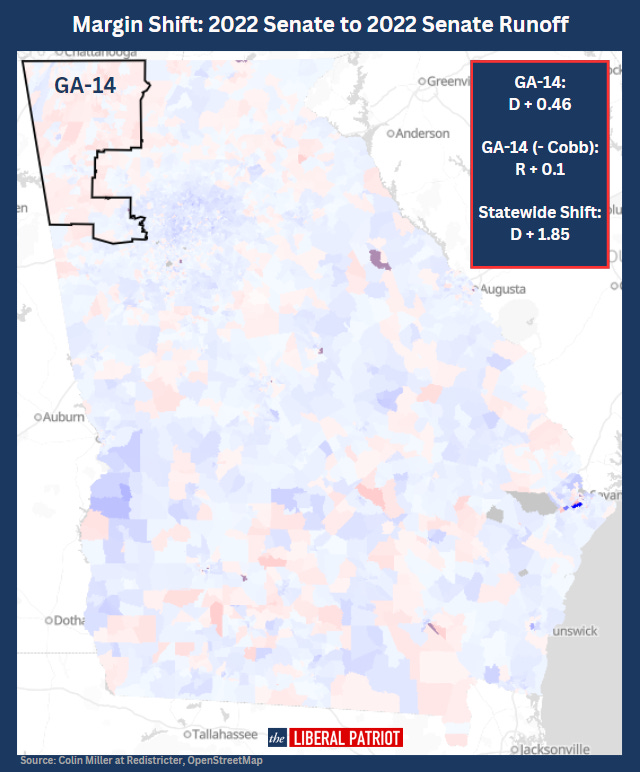Mark, Marjorie, and a Curious Case of Reverse Coattails
But will a presidential year tell the same story?
Mark Robinson will lose the North Carolina gubernatorial election. Polls show him down 12 to 15 points, Republican PACs have stopped running ads, and much of his campaign staff has quit. His looming defeat, however, has Democrats asking if Robinson might drag down Trump as well—a phenomenon known as “reverse coattails.”
It’s an argument I’ve long been skeptical of and I wrote back in April that the Biden campaign’s reliance on such an effect was foolish. Still, it’s hard not to wonder: What if Mark Robinson really is that bad? A political-science-breaking sort of terrible that maybe, just maybe, actually hurts Trump at the top of the ticket.
The theory sounds enticing for Democrats, but ultimately is hard to test. Mark Robinson-esque candidates don’t come around too often—great news for our country, bad news for this column. So in my search for an example of reverse coattails, I turn to the next best thing: Marjorie Taylor Greene and her weather controlling space lasers.
The 2022 Georgia Senate race offers an excellent natural experiment. In November of that year, Herschel Walker faced off against Raphael Warnock. Greene shared the ballot with them in Georgia’s 14th District. A month later, the two Senate candidates competed in a runoff—this time without Greene on the ballot. The comparison offers pretty compelling evidence that Marjorie Taylor Greene did hurt the top of the GOP ticket.
The map above shows the margin shift between the Senate general election and runoff. After a narrow one-point win in November (just shy of the requisite 50 percent), Warnock improved his statewide margin to 2.8 points in December. Unsurprisingly, then, much of the margin-shift map is blue. Except Greene’s district.
While the 14th’s sliver of suburban Cobb County did shift blue, the remainder of the district actually went towards Walker—despite the state moving two points to the left. Just twenty-three of Georgia’s 159 counties shifted red in the runoff. Six of those were in Greene’s district. Turnout, too, dropped more in GA-14 than in the rest of the state between November and December.
Not all that much had changed: the Senate candidates were the same and only a month separated the elections. The only reasonable explanation for such a district-specific shift is, of course, Marjorie Taylor Greene.
Her Democratic opponent, Marcus Flowers, raised more than $10 million—a ludicrous sum for an uncompetitive House seat. Though he had no hope of winning, Flowers seems to have convinced some voters to cast a ballot against Greene (or perhaps she did this all by herself). While in the ballot booth, they penciled in the rest of the Democratic ticket, giving Raphael Warnock a small boost at the top of the ticket. In December, however, the incentive to vote against Greene was gone and these voters stayed home—to the benefit of Herschel Walker.
So what about North Carolina this November? I’m still not convinced a reverse coattails effect will materialize.
The bar to turn out (or persuade) a marginal voter in a presidential year is simply much higher than in a midterm year. It’s entirely reasonable that a few voters who planned on staying home—or voting straight-ticket Republican—in the midterms might have changed their mind because of Greene’s antics. But to convince voters who are sitting out the presidential race to come off the sidelines because of a gubernatorial candidate? A tall task.
If you weren’t planning on voting after hundreds of millions in ads and months of wall-to-wall coverage, Mark Robinson probably won’t be what gets you off your couch. And even if that’s what tips the scales, your opinion of Robinson probably doesn’t change your opinion of Harris or Trump. Like we saw with Greene, if Robinson had been running statewide in a midterm, the GOP would be right to worry. But in 2024, the presidential race trumps all.
Democrats will be thrilled to hold the North Carolina governor’s mansion. If a few state House seats break their way, Josh Stein’s veto pen will prove quite powerful. But to expect a meaningful reverse coattails boost in a presidential year is likely fool’s gold. Kamala Harris will still have to win the Tarheel State on the strength of her own campaign.







I know it's not fashionable but something seemed more screwy in GA than anywhere else in 2020 to me. Lots of other places got a ton of attention, but it's really, really, really hard for me to understand so many Kemp votes alone. No one filled out the entire rest of their ticket on that many votes? Nothing? It was weird. Just marks for Kemp and nothing else on the entire ballot. I can see a few people doing this. The amount was entirely a new thing for GA especially.